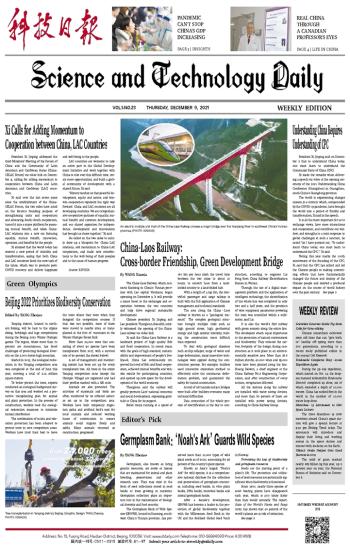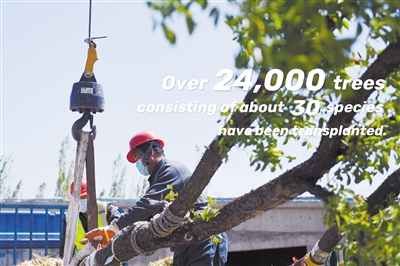
 Real China through a Canadian Professor's Eyes
Real China through a Canadian Professor's Eyes Pandemic Can't Stop China's GDP Increasing
Pandemic Can't Stop China's GDP Increasing Xi Calls for Adding Momentum to Cooperation between China, LAC Countries
Xi Calls for Adding Momentum to Cooperation between China, LAC Countries China-Laos Railway: Cross-border Friendship, Green Development Bridge
China-Laos Railway: Cross-border Friendship, Green Development Bridge Understanding China Requires Understanding of CPC
Understanding China Requires Understanding of CPC Beijing 2022 Prioritizes Biodiversity Conservation
Beijing 2022 Prioritizes Biodiversity Conservation WEEKLY REVIEW
WEEKLY REVIEW Germplasm Bank: ‘Noah's Ark’ Guards Wild Species
Germplasm Bank: ‘Noah's Ark’ Guards Wild Species
 |
| Tree transplantation in Yanqing district, Beijing. (Graphic Design: TANG Zhexiao; PHOTO: XINHUA) |
Yanqing district, located in northern Beijing, will be host to the Alpine skiing, bobsleigh and luge competitions during the Beijing 2022 Winter Olympic games. The region, where more than 70 percent are mountainous, has faced challenges of protecting biological diversity on the 2,000 meter-high mountain.
Started in 2015, the ecological restoration in the Yanqing competition area was completed at the end of June this year, covering a total of 2.14 million square meters.
To better protect the trees, experts conducted an ecological background survey on this area and worked out a protective transplanting plan for animal and plant protection. In the process of construction, workers took the ecological restoration measures to minimize human interference.
The combination of in situ and relocation protection has been adopted to protect trees in core competition areas. Workers have tried their best to leave the trees where they were when they designed the competition courses. If that was not possible, most of them were moved to nearby sites, or transplanted at the foot of mountain in the Winter Olympic Forest Park.
More than 24,000 trees that consisting of about 30 species have been transplanted from 2017, with a survival rate of 90 percent (As shown below).
A set of management and monitoring system has been set up for every transplanted tree. All trees in the entire Yanqing competition zone (except the Olympic Village) are registered and had their profiles marked with a QR code.
Animals are also protected. The activities of mammals and birds are often monitored by 29 infrared cameras set up in the competition area. Workers have built temporary migration paths and artificial bird's nest for local animals and reduced working hours of construction to ensure animals could migrate freely and safely. Many animals returned as construction progressed.

 Next
Next



